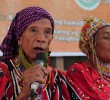The Philippine mainstream media, most notably the major dailies, began publishing frequent editorials and special reports on the killings and disappearances in mid-2006, in contrast to their previous silence on this issue. Statements of concern about human rights violations were issued by groups like the Catholic Bishops Conference of the Philippines (CBCP), the Philippine Political Science Association (PPSA), and the UP University Council � as well as mainstream opposition politicians like Rep. Francis Escudero and Sen. Aquilino Pimentel Jr., and even a few administration politicians like Sen. Joker Arroyo, as well as the Commission on Human Rights (CHR), a quasi-governmental body.
On May 12, 2006, the Arroyo administration formed Task Force Usig, a Philippine National Police (PNP) body led by Police Deputy Director General Avelino Razon to probe into the killings of activists and journalists. The task force was given 10 weeks within which to yield results from its probe. To date it has yet to come up with a full report, more than two months after its deadline.
�In the harshest possible terms I condemn political killings,� Arroyo said in her 2006 State of the Nation Address (SoNA) before Congress last July 24, 2006. �We together stopped judicial executions with the abolition of the death penalty. We urge witnesses to come forward. Together we will stop extra-judicial executions.�
This statement, however, failed to reassure quarters that had raised their voices to condemn human rights violations under the Arroyo administration. For immediately before uttering these lines, she heaped praises on Palparan.
�And we will end the long oppression of barangays (villages) by rebel terrorists who kill without qualms, even their own,� she said. �Sa mga lalawigang sakop ng 7th Division, nakikibaka sa kalaban si Jovito Palparan (In those regions under the supervision of the 7th [Infantry] Division, Jovito Palparan is battling the enemy).� �Hindi siya aatras hanggang makawala sa gabi ng kilabot ang mga pamayanan at makaahon sa bukang-liwayway ng hustisya at kalayaan (He will not back down until the communities emerge from the night and rise towards the dawn of justice and freedom).�
By the term �rebel terrorists,� Arroyo was apparently referring to the Communist Party of the Philippines-New People�s Army (CPP-NPA), which is on the U.S. Department of State�s list of �foreign terrorist organizations� or FTOs. Similarly, the �killings� she was referring to are apparently those allegedly carried out by the CPP-NPA.
Matter of policy
In an interview with Bulatlat, a retired Army officer, who withheld his identity for security reasons, confirmed that the killings and other rights violations are the military�s handiwork. �It�s a matter of policy,� he said..
Since the families of the victims insist that members of the military are the culprits, �the obvious conclusion is that it is not a result of a purging within the NPA,� he added, �because the victims� families should know the sentiments of their kin.�
The fact that the president praised Palparan in the 2006 SONA would only mean �she agrees with what Palparan is known for,� the source said.
�Purge�
The Armed Forces of the Philippines (AFP) and the PNP have attributed the killings to an alleged �purge� within the ranks of the �communist movement,� of which they tagged many of the victims as leaders. This was shown in Bulatlat interviews with provincial and regional police officers, as well as investigation reports obtained from local police units, for its two-part series on political violence and forced disappearances titled �Who are Behind the Violence and Disappearances?� and �A Reign of Silence by GMA,� published in mid-2005. This was the same line pursued by Task Force Usig early on.
Arroyo�s statement referring to �rebel terrorists who kill without qualms, even their own� fits neatly within the AFP and PNP line on the killings, and glosses over the analysis that lawyer Remigio Saladero, Jr. put forward in Bulatlat�s interview with him for the two-part investigative series published in 2005. In the interview, Saladero observed that from historical experience, the NPA has not killed anyone without admitting the act.
�Why so?� Saladero said, �because they consider that a political victory on their part. They would explain why the person was killed or �punished.� But in these cases there is no admission by the NPA.�
In the cases of extra-judicial killings reported by various human rights and people�s organizations under the Arroyo regime, including those in Central Luzon which is under the jurisdiction of the 7th Infantry Division, there has been no admission by the NPA of having any hand in the acts.










